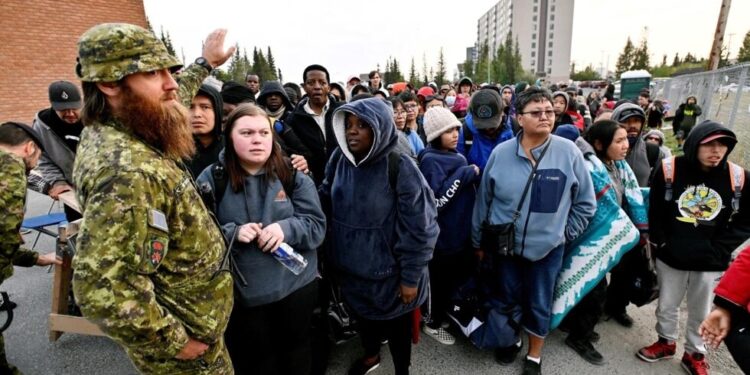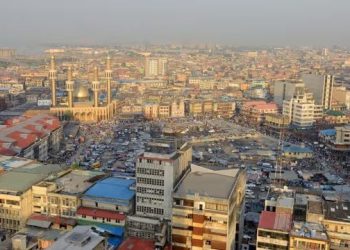Canadians residing in Fort Nelson have been forced to leave their homes in thousands as an intense wildfire could hit the western part of the country.
According to fire experts and officials, this evacuation is also based on forecasts of strong winds that have been fueling the out-of-control blaze.
The British Columbia wildfire service said the blaze is burning just 2km (1.2 miles) north-west of Fort Nelson, which has already seen about 3,500 people evacuated from there after an order to leave was issued on Friday.
READ MORE: LemFi Suspends Ghana Operations, Here’s Why
In a video posted on social media late on Sunday, the fire behavior specialist Ben Boghean with the British Columbia Wildfire Service said the extreme fire behavior – made worse by years of drought and a below-normal snowpack this past winter – could end up threatening the crews that have been fighting the nearby Parker Lake wildfire.
Fort Nelson is located in the far north-eastern corner of British Columbia, about 1,600km (995 miles) from the city of Vancouver. Fort Nelson and the Fort Nelson Indian Reserve have a combined population of about 3,400 people.
The wildfire threatening Fort Nelson continues to grow, with the most recent update late on Sunday night indicating it had swelled to nearly 53 sq km (20 sq miles).
Rob Fraser, mayor of the Northern Rockies regional municipality based in Fort Nelson, said that fire crews and emergency workers are preparing for a “last stand” if the fire advances into the town itself.
Fraser urged anyone who had previously defied the order to leave immediately, warning that local resources such as water pressure and electricity may diminish or stop outright for public use since much of the supply will be directed to support firefighters trying to suppress the wildfire.
More
The province’s minister of emergency management, Bowinn Ma, said on Sunday night the province was setting up an additional space with 200 rooms in Sunset Prairie, a community 440km south of Fort Nelson (273 miles), to supplement limited accommodations for evacuees.
The blaze is one of several out-of-control wildfires in western Canada threatening nearby communities in provinces such as Alberta and Manitoba.
“The wind is going to be sustained and it is going to push the fire towards the community,” Chapman, BC wildfire’s director of operations, warned in Sunday night’s update video about the fire threatening Fort Nelson.
“Escape routes may be compromised and visibility will be poor as the fire continues to grow,” he said.
Fires are also burning near Fort McMurray and Grande Prairie in Alberta, while officials in Manitoba have evacuated about 500 people from the community of Cranberry Portage, some 700km (434 miles) north-west of Winnipeg.
The regional municipality of Wood Buffalo in north-eastern Alberta has maintained an alert for Fort McMurray residents to be ready to evacuate on short notice, as the fire located about 16km (10 miles) to the south-west has reached 55 sq km (22 miles) in size.
Smoke from the fires has prompted air-quality alerts spanning from BC to Manitoba.
Meanwhile, despite the warnings for people in Fort McMurray to be ready to flee at a moment’s notice, schools there were still open on Monday.
Both the public and Catholic school divisions in Fort McMurray said they continued to monitor the situation, and that they understood some parents may not want to send their kids to school right now.
Both school divisions said that provincial achievement tests scheduled for this week were being postponed.
An update by Environment Canada this week predicted challenging weather conditions that could lead to another difficult wildfire season ahead.
Higher temperatures in the spring and summer could “exacerbate the risk and intensity of both natural and human-caused wildfires”, officials said.
A warmer-than-normal winter that left little snow on the ground also compounded droughts in several regions.
Globally, last year was the hottest on record. It was driven by human-caused warming but also boosted by a natural weather system called El Niño.
Backstory
In 2023, Canada witnessed a record number of wildfires that also caused choking smoke in parts of the US and forced more than 250,000 Canadians to evacuate their communities. There were no civilian casualties, but at least four firefighters died while battling the blazes.
You Should Know That
- Fires happen naturally in many parts of the world, including in Canada.
- But climate change is making the weather conditions needed for wildfires to spread more likely, according to the UN’s climate body.
- Extreme and long-lasting heat draws more and more moisture out of the ground and vegetation.










